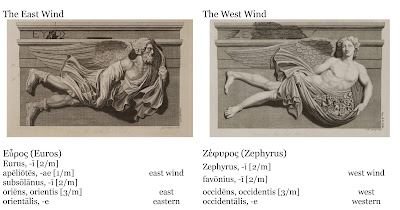Salvēte │ Hello
Vēr iam adest │ Spring is
already here.
Gaudeāmus igitur │ Therefore, let us rejoice.
Hodiē sōl lūcet │
The sun is shining today.
Avēs volant in
caelō et canunt │ The birds are flying in the sky and singing.
Aliae bēstiolae
vigent │ Other little
creatures are thriving / flourishing.
Flōrēs crēscunt │
The flowers are growing.
Ergō scrīpsī
novōs versūs │ Therefore, I have written new verses
Laudāns vēr │ While praising the spring.
Pepigī
distichon │ I’ve
composed a couplet (two-line verse)
Dē hōc tempore
annī │ About this season
Quod mihi valdē placet │
Which I really like (which is really pleasing to me).
Ecce │ Here it is
Adsunt nunc flōrēs vernālēs suāveolentēs │
The sweet-smelling spring blooms are now here
Bēstiolae
gaudent, frīgora nunc aberunt │ The little
creatures rejoice, the cold will now be away / gone
Valēte │ Good-bye
The fragrant vernal
flowers now are here
The cold will go and little beasts will cheer
Vocabulary
alius, -a, -ud:
other
bēstiōla, -ae
[1/f]: little beast / creature; -ol- creates a diminutive (smaller
version) of bēstia, -ae [1/f]: beast
frīgus, frigoris
[3/n]: cold; coldness; often appears in the plural even though we would
translate it as singular
distichon,
distichī [3/n]: couplet; two-line verse; distichon; a Greek-type
noun hence the /n/ in the nominative: distichon
pangō, -ere,
pepigī [3]: compose (usually in verse, but also in song)
tempus, temporis
[3/n] annī: (literally) time of the year = season
vēr, -is [3/n]:
spring
vērnālis, -e:
spring (adjective); flōrēs vērnālēs: spring flowers
versus, -ūs [4/m]:
verse
vigeō, -ēre, viguī
[2]: be vigorous; thrive; flourish
Notes
[i] Vēr iam adest
│ Spring is already here; adsunt …
flōrēs │ the flowers are here
frīgora nunc aberunt │ the
cold(s) will now be away / distant / gone
The verb sum; esse
(be) with prefixes:
adsum, adesse: be here /
present
absum, abesse: be away
[ii] flōrēs crescunt
│ the flowers are growing
When you see -sc-
before the verb ending it indicates the beginning of something
or becoming something else; in grammar they are known as inchoative verbs:
https://adckl.blogspot.com/2024/05/200424-inchoative-verbs.html
sōl lūcēscit
│ the sun is beginning to shine
vesperāscit
│ it’s becoming evening
[iii] participles;
look out for -ns and -nt-
Ergō scrīpsī novōs
versūs │ Therefore, I have written new verses
Laudāns vēr
│ While praising the spring
flōrēs … suāveolentēs
│ sweet-smelling flowers < suāvis, -e: sweet + oleō, -ēre, oluī:
smell
[iv] gaudeāmus igitur
│ let us, therefore, rejoice
From the academic
song:
Gaudeāmus
igitur / Iuvenēs dum sumus │ Let us, therefore, rejoice,
while we are young
This is a subunctive: gaudēmus │ we rejoice > gaudeāmus │let us rejoice; Latin uses the subjunctive to express “Let’s do something”

































